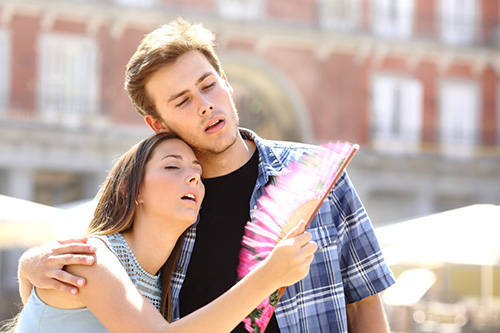Summer is a fantastic time of the year to be outside in the sunshine and the beautiful weather. However, the human body is not always able to regulate its temperature by just sweating, and the heat can be too much for the body to handle. Even though summer is fun, it helps to avoid heat-related injuries.

Dehydration From Not Drinking Enough Water
Dehydration occurs when you are not drinking enough fluids to replace what you lose in the heat. You must replace lost fluids to avoid dehydration. If a baby or small child is suffering from dehydration, you might notice a lack of tears when they cry. They may be listless, not have a wet diaper, and have sunken in eyes. An adult will be very thirsty and have dark urine if they can urinate at all. Also, adults tend to feel dizzy and confused.
There are several dangerous complications to dehydration. These complications include: heat-related illnesses, seizures, shock, and kidney issues. Dehydration is easy to avoid. You can drink lots of fluids and try to eat fruits and vegetables with high water content. Plan to keep up with your fluid intake throughout the day. By the time you feel thirsty, you are already dehydrated to some degree.
Heat Syncope From Physical Exertion
Heat syncope is mild compared to other heat-related injuries. This illness is the result of physical exertion in the heat. The body tries to cool itself, so the blood vessels dilate so much that the flow of the blood to the brain becomes compromised. If you are suffering from heat syncope, you might begin to feel faint or pass out. You could also feel dizzy or notice an increased heart rate. To feel better, find some shade and either lie down or sit. Drink plenty of fluids and avoid activity in the heat.
Low Salt Levels Can Cause Heat Cramps
Heat cramps are another mild heat injury. As your body sweats, you deplete your salt levels. Heat cramps are painful and occur in the arms, legs, or even abdomen. Often, heat cramps are a sign you are heading into heat exhaustion.
Heat Exhaustion From Lack of Sodium or Water
Heat exhaustion occurs when the body does not have enough sodium or water. Therefore, the blood volume might drop, which creates circulation issues. If you are struggling with heat exhaustion, you might experience any of the following:
- Nausea
- Muscle cramps
- Dizziness
- Unusual anger
- Copious amounts of sweat
- High body temperature
- Thirst
- Headache
Body Temperature Too High Can Result In Heatstroke
Heatstroke is another hazard related to being outdoors or in a hot indoor environment.
A heatstroke, or sunstroke, is a heat-related illness that causes the body temperature to be high. Other symptoms include dizziness, confusion, and headache. Usually, you can tell if someone is suffering from heatstroke because they have stopped sweating. If you’re worried that you or someone you are with has heatstroke, make sure to seek medical attention immediately.
Remember, if you’re outside in the heat – be it running a marathon, spending the day biking with the family, or out doing yard work – it’s important to stay hydrated at all times! Prairie Orthopaedic can help if you need guidance or assistance in keeping hydrated and healthy. Schedule an appointment today!

